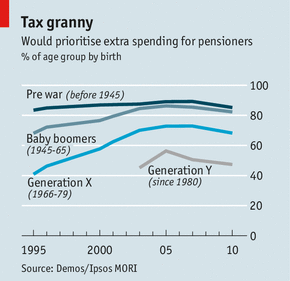Social attitudes
社會態度
Generation gap
代溝
Why a resurgence in support for the welfare state won’t help Labour
為什么支持福利國家的呼聲重起不利于工黨
Sep 14th 2013 |From the print edition
MANY reasons can be found why public support for Britain’s welfare system should be waning. The economy remains debt-ridden, the deficit large. Five more years of austerity will drain funding from services Britons cherish, like schools and the NHS. It explains why politicians talk of “strivers”, aiming to tap into a perceived view that those receiving benefits have it easy.
可以找到很多公眾支持英國福利制度逐漸減弱的原因。經濟仍然債臺高筑,財政赤字巨大。接下來五年的財政緊縮會耗盡英國人珍惜的公共服務所需資金,比如說學校和國民保健服務。這解釋了為什么政治家談論“奮斗者”,目的在于改變人們的觀點,說明上述福利來之不易。
But new data suggest that politicians may have misjudged the public mood. The latest British Social Attitudes (BSA) survey, published on September 10th, revealed that sympathy for those on benefits, on a downwards trend since 1989, has started to rise. Those agreeing that benefits should “provide a decent standard of living for the unemployed” rose from 50% to 59% in the period between 2006 and 2012.
但是,最新數據表明政治家可能誤判了公眾的情緒。發布于9月10日的最新的英國社會態度調查顯示自1989年以來都呈下降趨勢的同情那些福利的情緒開始上升。同意福利應該給失業者提供一個合適的生活標準的比例從2006年的50%上升到了2012年的59%。
Those who thought benefits were “too high and discourage work” fell from 62% in 2011 to 51%, and more people thought cutting benefits “would damage too many people’s lives.” Alison Park, of the BSA team, says sympathy for benefits claimants often rises in recessions, but in this downturn the effect had not clearly appeared until this year’s data.
認為福利太高,抑制了工作積極性的比例從2011年的62%下降到了現在的51%,越來越多的人認為削減福利會損害太多人的生活。英國社會態度調查團隊的Alison Park表示,同情福利救濟者的比例會在經濟衰退期有所上升,但是在這個衰退期,知道今年的數據出來作用才變得清晰。

Britons disagree on who should get cash, however. A report published by Demos, a think-tank, and Ipsos MORI, a pollster, showed that more than four-fifths of those born before 1965 would prioritise pensions over other benefits. Yet less than half of those born after 1980 would do so (see chart). Britons born before 1945 are less likely to support benefits for working-age groups than the average. Generations favour their own.
然而,對誰應該獲得救濟資金,英國人有分歧。一個智囊團Demos和民意調查機構Ipsos MORI發表的一份報告顯示,超過五分之四的1965年以前出生的人將優先考慮養老金。而1980年以后出生的人中只有不到一半的人支持這樣做。1945年以前出生的英國人更不可能支持給適齡工作人員增加福利,低于平均支持率。每一代人都維護自己的利益。
With more cuts expected after the next general election, which part of the welfare budget to spare divides Britain’s political parties. The Conservatives have promised to exclude pensions from any spending cap. With their own pots safe, the BSA data suggests grey-haired voters might welcome other cuts. Only 10% of the pre-war generation regard unemployment benefit as a priority. Single parent handouts are especially unpopular with older Britons: only 3% support them.
預計下一屆大選之后福利削減會加大,福利預算的富裕與否是英國各政黨之間的區別。保守黨已經承諾排除養老金的支付上限。英國社會態度數據顯示,老年人自己的福利有保障之后,他們可能會歡迎其他福利的削減。只有10%的戰前公民會優先選擇失業福利。單親救濟在英國老年人中最不受歡迎,他們中只有3%的人支持這項福利。
Labour’s brand of austerity should appeal more to the young. They propose to cap pensions, and oppose further cuts to child and housing benefits. It may prove a risky strategy: 76% of over 65s turned out to vote at the last election, whereas only 44% of those aged 18-24 bothered to do so. Labour’s poll lead is already dwindling, rising support for welfare may well quicken the pace.
工黨緊縮的形象對年輕人更有吸引力。他們提出限制養老金,反對對兒童和住房福利的進一步縮減。這可能是一項有風險的策略:上次選舉的時候76%的65歲以上的民眾參與選舉,而18到24歲的民眾只有44%的比例參與選舉。工黨的領先優勢已經在減少了,對福利的支持可能會加快其優勢減少的步伐。











